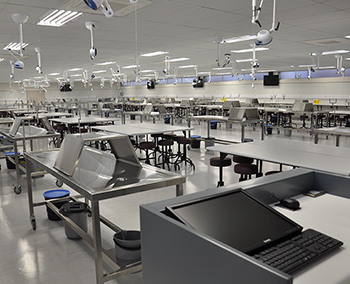Latest News Archive
Please select Category, Year, and then Month to display items
22 September 2021
|
Story Michelle Nöthling
|
Photo Supplied
 Annemarie Le Roux.
Annemarie Le Roux.
“I love working with children.” This is one of the first things Annemarie le Roux mentions when asked to describe herself. This love for children propelled Annemarie into the field of education and she graduated in 2006 with a BEd in Foundation Phase at the UFS. Annemarie immediately immersed herself in the Deaf community, enriching the lives of children at the Thiboloha School for the Deaf in Qwaqwa and the De la Bat School for the Deaf in Worcester.
The academic world enticed Annemarie back to the University of the Free State (UFS) and she was appointed as a junior lecturer in the Department of South African Sign Language (SASL) and Deaf Studies in 2013. Going from strength to strength, Annemarie completed her master’s degree in SASL in 2019, and published an
article earlier this year that she co-wrote with Marga Stander. In this article, they found that SASL “has become an increasingly popular language that hearing university students want to learn as a second language” and subsequently explored different teaching methods used for this emerging group of interested students.
Although now firmly established in academia, Annemarie is still committed to the practical application of SASL. “I am closely involved in student and community engagement through the
SIGNALS Sign Language student association that helps empower the Deaf community and South African Sign Language.” She also interprets for the Deaf community whenever she gets an opportunity, as well as for Deaf students in class and meetings.
On the importance of Sign Language and the recognition of the Deaf community in South Africa, Annemarie believes it will open greater opportunities for development. “More people will be able to learn SASL, and it might even become a subject in school for hearing children.”
New modern dissection hall ensures optimal learning experience for medical students
2015-12-14

New Dissection Hall in the Francois Retief Building on the Bloemfontein Campus.
Photo: Stephen Collett
|
The School of Medicine in the Faculty of Health Sciences at the university opened its doors on 6 June 1969. Three years later, a dissection hall for anatomy training was added to the school. This year, because of the prospective growth in the number of medical students as well as in changing methods of teaching and training, a new modern Dissection Hall has been completed on the Bloemfontein Campus. This ensures that students receive an optimal learning experience during dissection tuition.
The Dissection Hall was built as a double-storey wing to the existing Francois Retief Building. Covering 733m², the new facility is on the first floor - the same level as the existing hall - to allow easy access between the two facilities. The ground floor, totalling 465m², houses various offices for 16 people.
The new hall has special lighting and modern equipment for the training of second-year medical students in dissection. The hall also has high-quality sound and computer equipment. A unique camera system allows students to follow dissection demonstrations on 10 screens in the hall. Dissection demonstrations are recorded, enabling lecturers to compile new visual aid material for teaching and learning.
The dissection programme for medical students is of critical importance, not only for acquiring anatomical knowledge, but also for developing critical skills in medical students.
The new hall is also used for clinical workshops and postgraduate teaching seminars, as well as workshops in orthopaedics (shoulder, hip, and knee), otorhinolaryngology, cardiothoracic surgery (valve and endoscopy), and anaesthesiology, among others.
Both present and future generations of medical students will benefit from this new world-class facility.